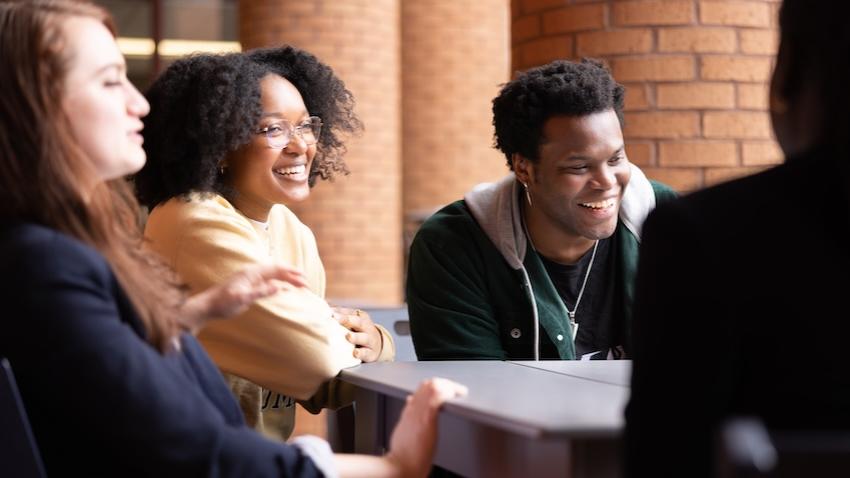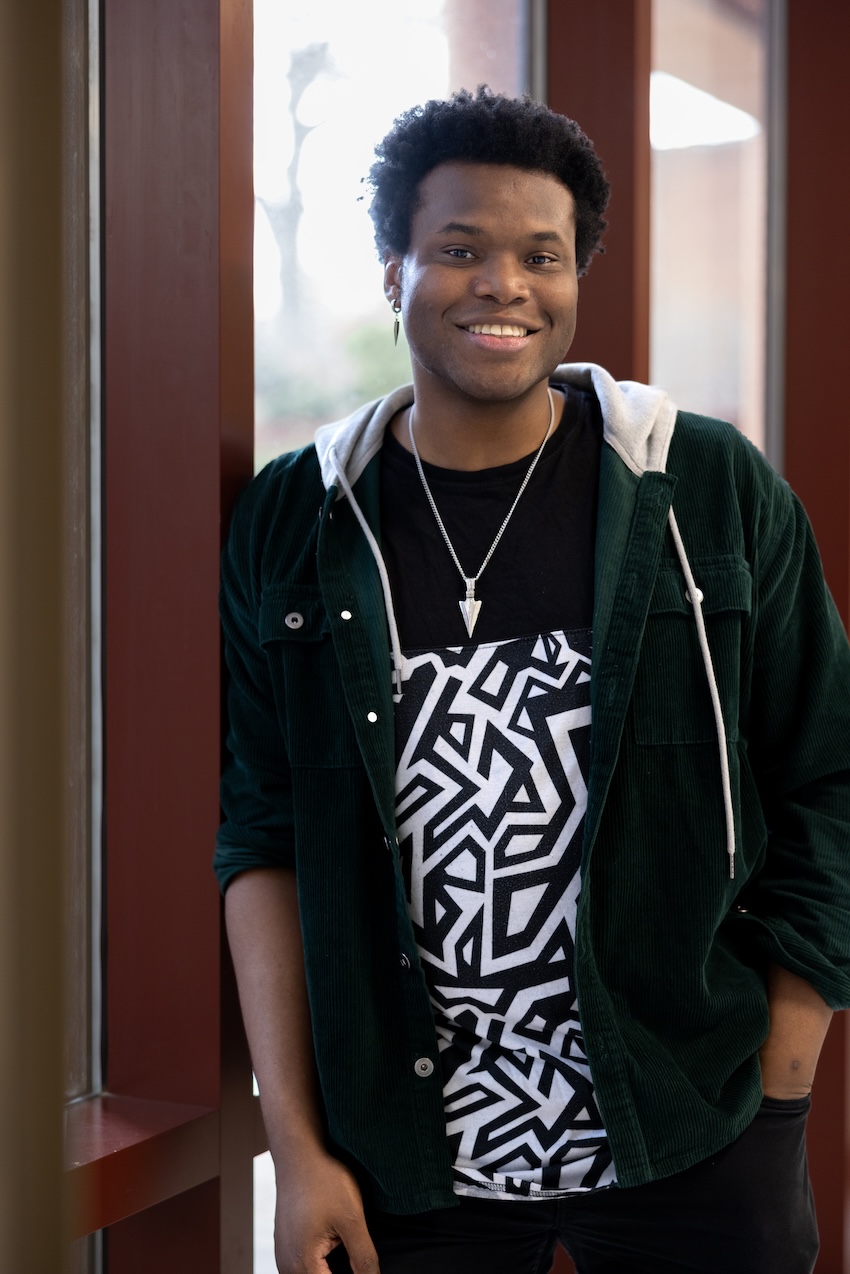
Helluva Journey: Graduate Student Reflects on 13 Years and 4 Degrees at Tech
For 13 years, Kantwon Rogers kept coming back to Georgia Tech for more.
More degrees to earn. More opportunities to teach. More lives to change.
He held six internships at companies such as Amazon, Google, and Intel Corporation, and each time he couldn’t wait to return to Georgia Tech’s campus.
His experiences at Georgia Tech have made it clear: Education is where he belongs.
“Every time I’ve interned, I didn’t like it, so I came back to school,” Rogers said. “Being in school for this long has never felt like compromising something else I would rather have been doing.”
Rogers said he’ll walk across the stage Thursday at McCamish Pavilion with no regrets as he receives his Ph.D. in computer science (CS) — the fourth degree he’s earned since arriving at Georgia Tech in 2011. He also holds his bachelor’s in computer engineering, a master’s in electrical and computer engineering, and a master’s in human-computer interaction (HCI).
That first master’s degree was mandated by his mother, Joan Dennis. She worked as a single parent without a college education in a competitive field in which most people had a master’s.
The second master’s changed his life. Rogers planned to pursue an engineering-based Ph.D. after his first master’s, but he missed the application deadline. He looked for alternatives to searching for industry jobs, and he learned the application deadline for master’s programs was later than Ph.D. programs.
“It was a blessing in disguise,” Rogers said. “My background before the second master’s had been in computer engineering. It wasn’t people-focused, and I realized I cared more about people than electrons. Doing my master’s in HCI, I learned what it meant to do research with people in mind and how to design technology with people in mind.”
That decision put his research on a new trajectory. When he earned his master’s in human-computer interaction, he knew the Ph.D. he wanted to pursue. Accepted into the CS Ph.D. program, Rogers worked with former School of Interactive Computing professor and chair Ayanna Howard, who is now the Dean of the College of Engineering at Ohio State.
Howard still advises Rogers along with School of IC associate professor Sonia Chernova. Rogers found a niche research field within human-robot interaction and built his dissertation around the ethics of robots and artificial intelligence and whether there are acceptable situations for a robot to lie to humans. For example, what should a chatbot tell a child if it is asked whether Santa Claus is real?
In 2023, Rogers became a finalist in Georgia Tech’s Three Minute (3M) Thesis Competition in which graduate students compete to explain their research in three minutes. He successfully defended his dissertation in November.
Student Teacher
Rogers hasn’t lost touch with the new waves of incoming students over the years. Thousands of current students and Georgia Tech alumna know him as an instructor of the Computing for Engineers course (CS 1371), a CS course required for engineering majors.

It’s the same class Rogers took his first semester as a freshman, and it became one of his favorite undergraduate courses. A master’s degree is required to teach the course. He inquired about becoming an instructor when he knew he would return for a second master’s.
Rogers remembered the first day he taught in front of hundreds of students as his best and worst day at Georgia Tech. He taught the class in the morning, and later that day, he learned his mother unexpectedly passed away.
“It was a very conflicting time for me,” Rogers said. “Being able to teach the class helped me get through my mom’s death. I poured everything into it and tried to do everything I could to help students and be selfless the way my mom was toward me and my sister.”
Rogers said he wanted the class to be more than a requirement for engineering students to learn the basics of coding and computer programming. He saw it as an opportunity for engineering students to think differently about CS. He said some students have told him they switched their majors to CS because they took his course.
“I get to be the first exposure a lot of students get to computer science,” he said. “This class has 700 to 1,000 students every semester, and being able to have that kind of impact is very enticing.
“There’s never been a time since I’ve been teaching it when I didn’t look forward to it. Every day, I wake up excited to teach.”
Even when pursuing his Ph.D. consumed much of his time, he saw teaching as an outlet rather than a hindrance.
“Multiple people have told me to stop teaching because it doesn’t get you a Ph.D. For me, teaching has always been the fun part. There’s more in life than research, and teaching was an important counterbalance.”
Staying Connected
Rogers has also never been one to stay in a comfort zone or cut himself off from campus life. In addition to teaching CS 1371, Rogers has lived on campus throughout his time at Georgia Tech. As a grad student, he has been a resident advisor at Smith Hall and Hanson Hall, which house first-year students.
“I’m up to date on all the slang that comes out,” Rogers said. “It helps keep me relatable. I know what it’s like being a freshman taking this class, not knowing college, not knowing yourself, being confused. They’ll be going through problems in their lives, and I’m able to help them because I’ve been through some of the same things.”
Rogers said his career goal is to become a university president, but what's next in the immediate future is still up in the air.
He’s applied for postdoc positions and hasn’t ruled out returning to Georgia Tech in that capacity. He may also teach CS 1371 one more semester in the spring while he sorts out his plans. However, he’s treating this semester as his last and preparing his goodbyes.
“I don’t know what emotions I’ll feel,” Rogers said about attending the Ph.D. graduation ceremony Thursday. “I’ll let myself feel whatever I want. Throughout this process, I’ve been delusionally proud of myself for everything I’ve done.”
As computing revolutionizes research in science and engineering disciplines and drives industry innovation, Georgia Tech leads the way, ranking as a top-tier destination for undergraduate computer science (CS) education. Read more about the college's commitment:… https://t.co/9e5udNwuuD pic.twitter.com/MZ6KU9gpF3
— Georgia Tech Computing (@gtcomputing) September 24, 2024


